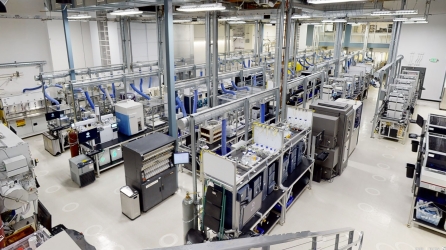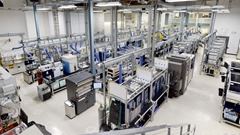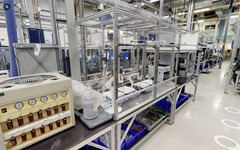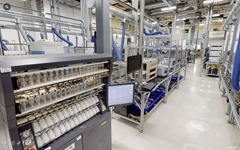Cloud labs are like a streaming service, but for lab equipment instead of media content.
Brian Frezza and D.J. Kleinbaum founded Emerald Therapeutics in 2010 to develop antiviral drugs. But they had to spend so much time troubleshooting the machines in their lab that they ended up generating tons of code to run their experiments automatically. Not only did efficiency ramp up, but reproducibility did as well. They realized that other labs could benefit from the virtual system they’d established, so they decided to sell subscription access to their equipment and software. Emerald Cloud Lab (ECL) spun off from Emerald Therapeutics that same year.

“Academics, small start-up firms and big pharma are increasingly turning to cloud labs as part of a trend to outsource work.”
Through the ECL dashboard, researchers anywhere in the world can dictate what experiments they want to run and when. They can watch them on video as they occur – and adjust them in real time. The company’s currently available techniques include cell culture, DNA synthesis, liquid chromatography (used to separate mixtures of molecules), and mass spectroscopy and nuclear magnetic resonance – two techniques used to help determine molecular structures. Researchers can send in their own samples and reagents or buy them from ECL’s inventory. Cloud labs provide a similar outsourcing service to contract research organizations, in which human lab technicians do the work. But when something goes wrong in a cloud lab experiment, users can review the code to work out what it was – there is no one else involved.
Outsourcing lab work is convenient, highly reproducible and can help promote equity.
Data generated in cloud labs is extremely reproducible. Cutting and pasting an experimental protocol ensures that it is done exactly the same way every time. These labs are accessible to those who might not otherwise have access to such sophisticated and expensive equipment, like high school students or scientists in poorer regions. ECL uses the highest level data encryption available to ensure that bad actors, like terrorists, don’t take advantage of this access for nefarious ends.
Carnegie Mellon University Cloud Lab will be the first to operate in an academic setting.
Dmytro Kolodieznyi, a chemist at ECL, was able to reproduce years of his PhD thesis work with just one week of coding time. Based on his experience, and further motivated by COVID-19’s disruption of research work, Carnegie Mellon University in Pittsburgh, Pennsylvania invested $40 million in a partnership with ECL to build the first cloud lab in an academic setting. Construction began in November 2021, and the facility should be up and running by mid-2023.
The Carnegie Mellon Univeresity Cloud Lab can handle all aspects of daily lab work, from experiment design to data acquisition and analysis. Housing more than 180 unique types of scientific instruments for life sciences and chemistry experiments, CMU-affiliated researchers are provided access to a wide array of tools to explore important questions for the future of humanity and the world.





